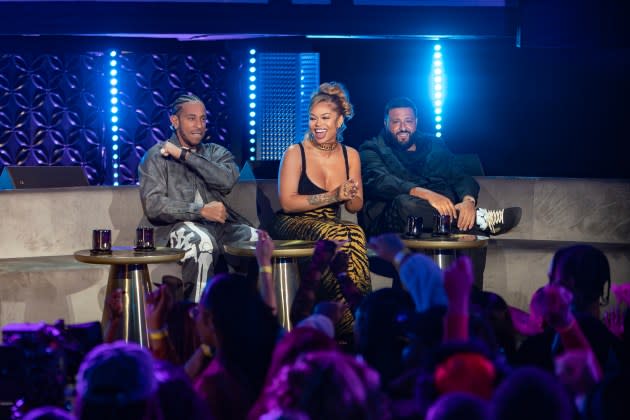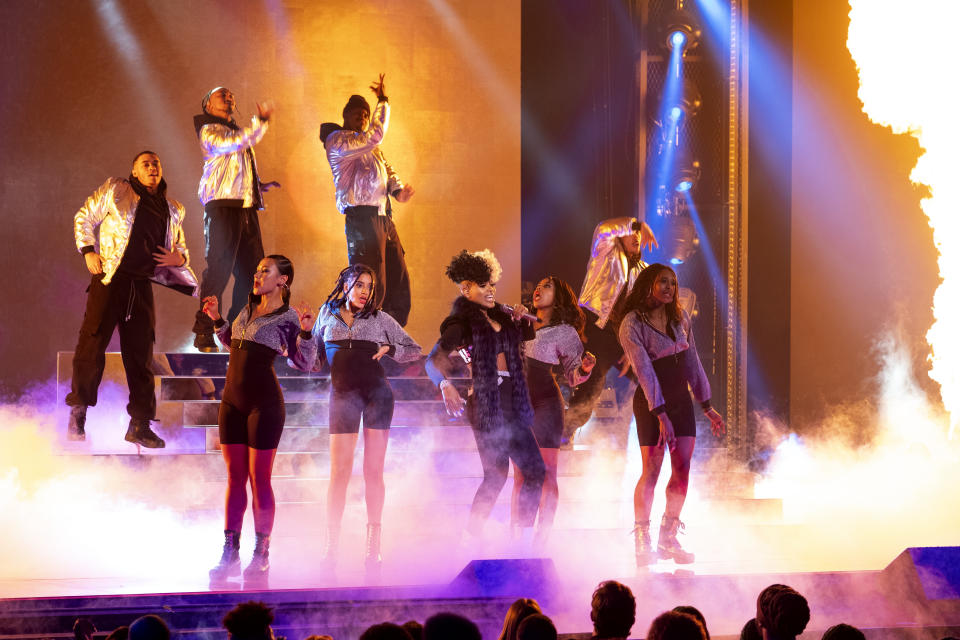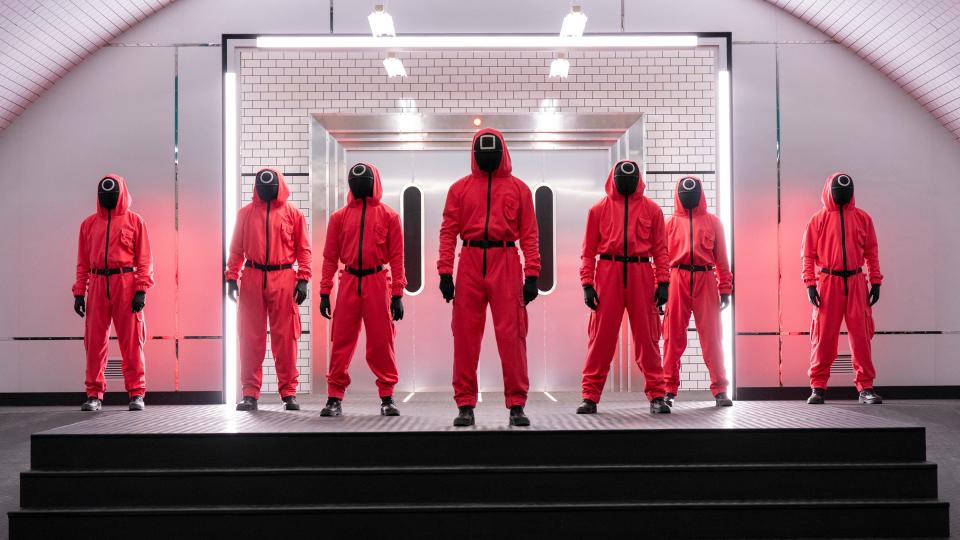Netflix Reality Boss Jeff Gaspin Hunts “Broadcast Replacement” Formats & Seeks “Fresh Takes On The Familiar”

Netflix made some noise in the unscripted world when it hired Jeff Gaspin, the former NBCUniversal chief, as its new defacto reality boss earlier this year.
The hire ostensibly signaled that the streamer wanted to step up its unscripted efforts and take on the broadcast networks when it comes to buying big entertainment formats.
More from Deadline
During his time as NBC’s head of alternative entertainment, he developed series including The Apprentice, The Biggest Loser and Deal or No Deal and after his promotion, his last act as Chairman of NBC Universal Television was buying The Voice, which other than The Masked Singer, was arguably the last major entertainment format to breakthrough on the broadcast nets.
Netflix is now doubling down on efforts to find its version of The Voice.
“The difference from the past is we want to focus on bigger formats, more of what you would call broadcast-style shows versus the cable style shows. I’ve done both in my career from running NBC to running Bravo, so I’m familiar with both and I really do understand the difference,” he told Deadline.
Its next attempt to crack this genre is Building The Band. The series is essentially a search for the next great band with 50 talented singers competing for a spot.
Gaspin said that it’s a social experiment paired with a singing competition. “That’s what we like to do at Netflix, we like to twist it a little bit. It’s not just completely straightforward, it’s not a show you’ve seen elsewhere,” he said. “We like to say that we’re looking for a fresh take on the familiar.”
“Some of the things we are going to do are definitely a little more broadcast replacement, Building The Band being one of those shows. There hasn’t been a new U.S.-based boy band in a while,” he added.
Netflix has tried this before with Tituss Burgess-fronted karaoke format Sing On!, which only lasted one season, and Rhythm + Flow, which Gaspin produced via his Gaspin Media banner.
The latter was handed a second season in 2020 but it’s taken close to five years for it to return. DJ Khaled, Ludacris and Latto are replacing Cardi B, Chance The Rapper and T.I as judges with Eminem joining as a special guest.
Gaspin said that Rhythm + Flow was “broader than you’d imagine”. “Netflix is really the only place you could make that show and have it be authentic. It’s something that that most broadcasters and even other streamers, would have to sort of stay away from. When I originally pitched it, that was the pushback from just about every other [buyer].”
“It’s not as broad as America’s Got Talent might be and we do want to try to crack that,” he added. Gaspin added that the streamer has “high expectations” when it returns later this year.

NBC’s The Voice is heading into Season 26, with new judges Snoop Dogg and Michael Bublé alongside Reba McEntire and Gwen Stefani, this fall; American Idol is heading into its eighth season on ABC and 23rd season overall, as the network searches for a high-profile replacement for Katy Perry and The Masked Singer returns to Fox for season 12 in the fall.
But Gaspin says that these broadcast networks no longer have the reach that they used to, or that Netflix has.
“An occasional success will pop-up, but the size of that success is nowhere near what it used to be. They can tout successes that are under a one rating or a one rating and that’s relevant relative to the marketplace, but it’s nowhere near the seven or eight plus ratings we used to get in demos and more than that in households. What’s happened with a platform like Netflix is we get a circulation that that allows for hits to be true global hits, not just hits relative to our other shows,” he said.
Gaspin’s comments echo recent quotes from Netflix Co-CEO Ted Sarandos in a recent New York Times podcast interview.
“If there’s one quote that I could take back, it would have been in 2012, I said we’re going to become HBO before HBO could become us. At that time, HBO was the gold standard of original programming. What I should have said back then is, ‘We want to be HBO and CBS and BBC and all those different networks around the world that entertain people’, and not narrow it to just HBO. Prestige elite programming plays a very important role in culture. But it’s very small. It’s a boutique business. We’re currently programming for about 650 million people around the world. We have to have a very broad variety of things that people watch and love,” he said.
Netflix’s latest push into the world of unscripted entertainment comes at an uncertain time for producers. The decline of cable has impacted many companies and it’s increasingly harder for independent producers to get large-scale shows away on the broadcast networks.
“I was a producer three months ago so I’m very familiar with this marketplace. It’s not unhealthy but it’s not as healthy as it once was. At Netflix, it’s still quite healthy because the business model works. Many of our competitors are trying to figure out the business model that works for them and as a result have pulled back on a lot of their content spend, so it has created a frustrating marketplace,” he said.
Building The Band is produced by Remarkable Entertainment, the Banijay UK company behind series such as long-running British game show hit Pointless, while its other new show, Battle Camp, which sees a slew of Netflix reality stars compete for $250,000, comes from Fremantle-owned Thames, the British company behind Britain’s Got Talent and The X Factor, as well as Netflix’s Too Hot To Handle.
Netflix has long worked with British producers on unscripted titles including some of its first forays such as Stellify Media’s Flinch and Awake: The Million Dollar Game from Hello Dolly.
Gaspin has an interesting observation as to why this is the case. “A lot of broadcast production companies focused on cable over the years, very successfully. Cable became the dominant platform, from the early 2000s, through to 2014, before streaming came into being. Cable was taking a lot of audience away from broadcast, so there were a lot of production companies in the U.S. that were created to service cable. But in the UK, cable was not as big a deal, so those same production companies that existed in Europe, focused on broadcast formats,” he said.
Whereas unscripted producers in the States focused on shows such as Deadliest Catch and Pawn Stars, “there’s just a little bit more experience coming out of some of the UK companies on these bigger formats”, he added.
One of the interesting dynamics of the international formats business is that many of the shows that end up becoming hits in the U.S. start in much smaller markets.
The Traitors, which has become a hit for Peacock, started as Dutch series De Verraders, NBC’s upcoming adventure series Destination X started as a Belgian show and The Masked Singer began as The King of Mask Singer in South Korea.
ABC’s Dancing with the Stars, Shark Tank and American Idol, CBS’ Big Brother and Survivor, Fox’s MasterChef, Hell’s Kitchen, Lego Masters, Special Forces and Farmer Wants A Wife and NBC’s AGT, The Voice and American Ninja Warrior all started in other countries.
The challenge that a global streamer like Netflix has is that it would essentially like to create its own hits rather than adapt formats, which is harder to do.
“Our preference is to own the world rights with these formats. At Netflix, you have a better chance of creating a global hit. That said, there will be an occasional show, more likely an existing piece of IP, where we might consider split rights,” said Gaspin. “If a show already exists in one territory, and we can’t own that territory, but we can own the rest, missing one or two territories is fine.”

Talking of IP, Netflix is evidently on an intellectual property treasure hunt. Squid Game: The Challenge, which was produced by British companies Studio Lambert and The Garden, was in the top 15 titles of the last six months of last year, according to the streamer’s latest data dump.
Would Netflix consider Bridgerton: The Dating Show or a Night Agent competition series?
“I’m a fan of IP, it gives you an entry point, and it gives you some familiarity. Not every piece of scripted content should be unscripted. You have to be careful. It could also be a trap, but I love looking at IP as a potential source,” he said.
Deadline revealed last month that the streamer was developing a reality series based on Willy Wonka after it acquired The Roald Dahl Story Company. “It falls within IP and why I like IP,” he said.
Game shows are another area that Gaspin is hunting in. Netflix has made series such as Bullsh*t: The Game Show and The Trust: A Game Of Greed, as well as related shows such as Floor Is Lava, Nailed It!, and Is It Cake? but it has yet to find its own version of Who Wants To Be A Millionaire? or Deal or No Deal.
“I would like to be able to try a game show or two. But I don’t think it could be the traditional closed-ended game show. We’re a binge model for the most part and that means we’re dropping all the episodes at once. A game show that’s episodic, you watch one or two or three, and then you think to yourself, alright, that’s enough for now. Do you have to come back to it? Is there a driving force to make you come back?,” he said.
Gaspin, who produced To Tell The Truth, hosted by Anthony Anderson, for ABC between 2016 and 2022, highlighted Rob Lowe’s The Floor, which airs on Fox, as an example of a show that has some serialized aspects. “I need people to watch a few and then come back on their own, not because it’s schedule at 8pm on Wednesday nights,” he added.
The streamer has also dabbled in a slew of lifestyle programming such as Amazing Interiors, Fastest Car, Styling Hollywood, The Goop Lab with Gwyneth Paltrow, Million Dollar Beach House, Dream Home Makeover, World’s Most Amazing Vacation Rentals, Fresh, Fried and Crispy and How To Build A Sex Room.
Gaspin said that there are “pockets of shows” that will continue, but this is no longer the focus.
“We are going to try to lean into bold new formats. While we [used to] do equal amounts of cable replacement shows as broadcast replacement shows, I think we’re going to be leaning a little bit more towards broadcast replacement shows for now. That is a shift in our focus,” he added.

It will, however, remain in the property space, as evidenced by a slew of Selling Sunset spinoffs, and the dating world with Love Is Blind, which is arguably its biggest unscripted series to date.
That show, which comes from Kinetic Content, premiered in 2020 and just aired its sixth season. It will return for a seventh season and has already spawned eight international adaptations, including a forthcoming UK series. Kinetic is also behind The Ultimatum: Marry or Move On, which premiered in 2022 and returns for its third season in December, as well as spinoff The Ultimatum: Queer Love, which is returning for a second. Perfect Match is also back for its second season in June and Too Hot To Handle returns for season six in July.
On the whole, unscripted shows have a longer shelf life on Netflix compared to their scripted counterparts with series such as Queer Eye, which Gaspin worked on in its original incarnation at Bravo, heading into season nine and Somebody Feed Phil just airing its seventh season.
“If you look at shows like Survivor and Big Brother, unscripted shows have such as loyal fan base that they seem to be able to continue forever. Obviously, that’s not true of every unscripted show. But I think part of the reason is, it’s not that hard to adjust course. You can change a cast every season so it freshens it up. Those new casts allow you to create different kinds of drama and different types of storytelling. I think that’s one of the reasons that if you have a really good format, being able to change the cast on an annual basis, just seems to add to the allure,” he said.
Netflix has a number of renewal decisions to make over the coming months; Is It Cake?, The Trust: A Game of Greed, Somebody Feed Phil, The Magic Prank Show with Justin Willman and Unlocked: A Jail Experiment are all awaiting future seasons.
Gaspin said that these decisions are a little different than broadcast networks looking at the ratings. “We’re going to think about the binge model, the Netflix effect, and then, as with any platform, ask ‘Can you grow it or is this a show that has reached its peak?’. As long as it can maintain at this level, it’s good for us but if it’s a continued decline, that’s not good for any service. It’s not just statistics, we look at the quality of the series and the quality of the production team and ask ‘Is this a show that over time, will get more attention?,” he added.
Building The Band and Battle Camp were both ordered before Gaspin joined the company, but he is now influencing the company’s unscripted slate in general. He said his first full slate is likely 18 months away. “I will say even shows that I didn’t commission, when they launch on the service and they’re successful, I get really excited for the team, because they work really hard on these shows, so seeing their efforts succeed is just great,” he said.
Gaspin, who also previously ran development for VH1, where he launched shows such as Behind The Music, is evidently enjoying his new found popularity as one of the few volume buyers in the business.
“I love it. I was fortunate in my career to work at MTV Networks in the ‘90s, when it was the coolest hottest place to be; I worked at NBC for many years when we were number one, and it was just a great place to be, innovative, creative and growing and now Netflix, in terms of the streaming world, is the coolest place to be and that’s why I came here,” he added.
Best of Deadline
Sign up for Deadline's Newsletter. For the latest news, follow us on Facebook, Twitter, and Instagram.
Solve the daily Crossword

